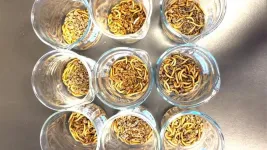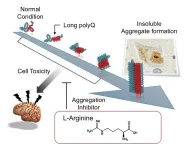(Press-News.org) Plastic pollution occurs in every ecosystem on the planet and lingers for decades. Could insects be part of the solution?
Previous research found that insects can ingest and absorb pure, unrefined microplastics—but only under unrealistic, food-scarce situations. In a new Biology Letters paper, UBC zoologist Dr. Michelle Tseng and alumna Shim Gicole tested mealworms in a more realistic scenario, feeding them ground-up face masks—a common plastic product—mixed with bran, a tastier option.
Reality bites
Mealworms are Nature’s scavengers and decomposers, able to survive up to eight months without food or water, and happy to eat their own kind when food is scarce.
After 30 days, the research team found the mealworms ate about half the microplastics available, about 150 particles per insect, and gained weight. They excreted a small fraction of the microplastics consumed, about four to six particles per milligram of waste, absorbing the rest. Eating microplastics did not appear to affect the insects’ survival and growth.
Plastic-eating partners
Dr. Tseng says the next step will be to learn from the insects’ digestive mechanisms how to break down microplastics, and scale up these learnings to address plastic pollution. “Perhaps we can start viewing bugs as friends. We’re killing millions of insects every day from general pesticides - the very same insects we could be learning from to break down these plastics and other chemicals.”
END
Can plastic-eating bugs help with our microplastic problem?
2024-12-04
ELSE PRESS RELEASES FROM THIS DATE:
Ocean density identified as a key driver of carbon capture by marine plankton
2024-12-04
UNDER EMBARGO UNTIL 00.05 GMT WEDNESDAY 4 DECEMBER / 19:05 ET TUESDAY 3 DECEMBER 2024
Ocean density identified as a key driver of carbon capture by marine plankton
New findings, published today in Royal Society Open Science, have revealed that changes in ocean density have a significant impact on the rate at which marine plankton incorporate carbon into their shells. This has profound implications for carbon cycling and the ocean’s ability to absorb atmospheric CO2 in response to climate change.
Up to now, researchers have focused on how ...
New drug candidate for spinocerebellar ataxia
2024-12-04
Niigata, Japan - A team led by Specially Appointed Associate Professor Tomohiko Ishihara and Professor Osamu Onodera at Niigata University, along with Professor Yoshitaka Nagai at Kindai University, conducted a randomized, double-blind trial on the efficacy and safety of L-arginine in treating Spinocerebellar ataxia type 6 (SCA6).
I. Background of the Study
Spinocerebellar ataxia (SCA) is a neurodegenerative disorder affecting the cerebellum, a part of the brain responsible for coordinating movement. Symptoms include difficulties with balance, coordination, and speech (ataxia ...
Small amounts of incidental vigorous physical exertion may almost halve major cardiovascular events risk in women
2024-12-04
Short bursts of incidental vigorous physical exertion, lasting less than a minute each, may almost halve the risk of a major cardiovascular event, such as heart attack or heart failure among women who don’t exercise regularly, finds research published online in the British Journal of Sports Medicine.
Just 1.5-4 daily minutes of high intensity routine activities, such as brisk stair climbing or carrying heavy shopping, may help to stave off cardiovascular disease among those either unwilling or unable to take part in structured exercise or sport, conclude the international team ...
Health + financial toll of emerging mosquito-borne chikungunya infection likely vastly underestimated
2024-12-04
The health and financial implications of the emerging threat of mosquito-borne chikungunya viral infection have most likely been significantly underestimated, with total costs probably approaching US$ 50 billion in 2011-20 alone, suggests a comprehensive data analysis, published in the open access journal BMJ Global Health.
In the short term, symptoms include fever, severe joint pain, rash and fatigue. While these often clear up, those affected can be left with long term, debilitating aftereffects, including chronic arthritic-type joint pain, fatigue, and depression, point out the researchers.
The ...
Tiny, daily bursts of vigorous incidental physical activity could almost halve cardiovascular risk in middle-aged women
2024-12-04
An average of four minutes of incidental vigorous physical activity a day could almost halve the risk of major cardiovascular events, such as heart attacks, for middle-aged women who do not engage in structured exercise, according to new research from the University of Sydney, published in the British Journal of Sports Medicine.
“We found that a minimum of 1.5 minutes to an average of 4 minutes of daily vigorous physical activity, completed in short bursts lasting up to 1 minute, were ...
Long-term benefit from anti-hormonal treatment is influenced by menopausal status
2024-12-04
Today, women with oestrogen-sensitive breast cancer receive anti-hormonal therapy. Researchers now show that postmenopausal women with low-risk tumours have a long-term benefit for at least 20 years, while the benefit was more short-term for younger women with similar tumour characteristics who had not yet gone through the menopause. The results are reported in the Journal of the National Cancer Institute (JNCI).
In Sweden, 9 000 women are diagnosed with breast cancer each year, with hormone-sensitive breast cancer accounting for about 75 percent of women diagnosed with the disease. In patients with hormone-sensitive breast cancer tumour growth is mainly driven by oestrogen and ...
Most of growth in high intensity hospital stays not explained by patient details
2024-12-03
In five states over nearly a decade, hospitals have increased how frequently they document patients as needing the highest intensity care, which has led to hospitals receiving billions in extra payments from health plans and government programs, according to a new RAND study.
Among thousands of cases involving hospitals stays for 239 conditions, researchers examined how often hospitals upcoded patients to the sickest end of the care spectrum, where hospitals charge payers at the highest rate.
The study found that from ...
OHSU study in neurosurgery patients reveals numerical concepts are processed deep in ancient part of brain
2024-12-03
New research reveals the unique human ability to conceptualize numbers may be rooted deep within the brain.
Further, the results of the study by Oregon Health & Science University involving neurosurgery patients suggests new possibilities for tapping into those areas to improve learning among people bedeviled by math.
“This work lays the foundation to deeper understanding of number, math and symbol cognition — something that is uniquely human,” said senior author Ahmed Raslan, ...
Predicting cardiac issues in cancer survivors using a serum protein panel test
2024-12-03
(MEMPHIS, Tenn. – December 3, 2024) Early disease detection is beneficial for securing the best possible outcomes for patients. But finding noninvasive, effective ways to predict disease risk is a tremendous challenge. Findings from scientists at St. Jude Children’s Research Hospital are showing promise for assessing cardiomyopathy risk in childhood cancer survivors. Heart disease is a well-established late effect for pediatric cancer survivors treated with anthracycline chemotherapy. The researchers identified a panel ...
Research on neurodegeneration in spider brain leads Vermont neuroscientists to groundbreaking new discovery in Alzheimer’s-affected human brains
2024-12-03
COLCHESTER, VT – Researchers from Saint Michael’s College and the University of Vermont have made a groundbreaking new discovery that provides a better understanding of how Alzheimer’s disease develops in the human brain.
Guided by previous research of spider brains, the scientists uncovered evidence of a “waste canal system” in the human brain that internalizes waste from healthy neurons. They discovered that this system can undergo catastrophic swelling, which leads to the degeneration of brain tissue, a hallmark of Alzheimer’s disease.
With over 50 million affected people worldwide, Alzheimer’s ...





